Since 1865, The Salvation Army has soldiered on through wars, natural disasters—and yes, even a pandemic. During the Spanish flu from 1918-1920, Salvation Army personnel helped nurse the sick, cleaned hospitals and provided encouragement to soldiers, according to The War Cry. As we face another global pandemic, this time COVID-19, the need to continue serving those experiencing poverty, hunger, homelessness and other vulnerabilities is as important as ever.
Season two of the Salvationist podcast addresses the question of how we do mission during a pandemic. In the six-part series, host Brandon Laird speaks with a diverse group of guests, from our territorial leaders to corps officers to employees, to unpack how ministry units and corps are continuing their ministry safely across the territory. Here is a collection of highlights from the Salvationist: Mission in a Pandemic podcast. To listen to the episodes in full, visit salvationist.ca/podcast.
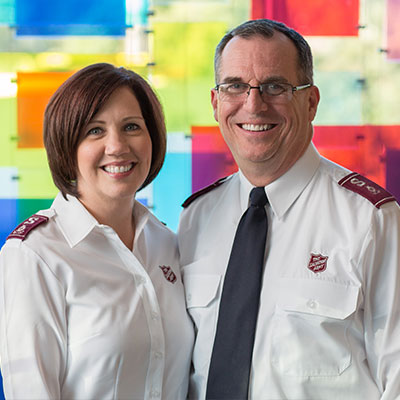 Episode one: Commissioners Floyd and Tracey Tidd, territorial leaders
Episode one: Commissioners Floyd and Tracey Tidd, territorial leaders
Brandon Laird: How does Mobilize 2.0, The Salvation Army’s new transformation project in Canada and Bermuda, fit into the backdrop of the COVID-19 pandemic?
Commissioner Floyd Tidd: The future of The Salvation Army is a conversation many of us have been having for decades, and certainly in recent years. Mobilize 2.0 is a season in the history of The Salvation Army in Canada and Bermuda that builds on the last five years’ emphasis on seven strategic priorities under Commissioner Susan McMillan and the banner Mobilize. Mobilize 2.0 emphasizes two key points: inspired for mission and positioned for growth. We built that project plan just as COVID-19 was beginning to sweep across the territory. That might have surprised us, but I am confident that it did not surprise God.
Commissioner Tracey Tidd: COVID-19 has added to the opportunity for us as a territory to not only prepare for change, but to be changed. It’s caused us to stop some things that we were currently doing and increase our work and efforts in other areas during the pandemic. We may not have been able to gather for worship, but I truly believe that we have gathered for mission in our centres, in our long-term care homes, our shelters, our family services and, most of all, our neighbourhoods. I believe we have more time to listen and to see what God is doing. Mobilize 2.0 is about seeking a fresh move of God, by his Spirit—just being able to slow down and seek after God. Mobilize 2.0 is about positioning for growth, to see what God is doing and what do we need to do to join him in that.
 Episode two: Claire Dunmore, community engagement secretary
Episode two: Claire Dunmore, community engagement secretary
Brandon Laird: The COVID-19 pandemic struck just as the new Pathway of Hope program was starting to grow across the territory. What safeguards were put into place to open safely?
Claire Dunmore: We have been intentional about reigniting the concept for Pathway of Hope. Throughout the pandemic, I always said, “Keep connected with people.” Whether that be to give someone a phone call or send a postcard, many ministry units across the territory were able to do that. For example, if a staff member worked with a client for several months before COVID hit, they could pick up the phone and ask them how they are doing, just to let them know that they were being thought of.
BL: Can you share an inspirational story from the Pathway of Hope program during the pandemic?
CD: One mother with two girls, ages five and 10, came to The Salvation Army for a food hamper. In her first appointment with a caseworker, she talked about her struggles of relocating from one province to another, and not knowing the systems or what was available to her and her children. She set some goals through Pathway of Hope for employment and education. She was referred to the local job agency and within five weeks of being in the Pathway of Hope program and submitting some resumés, she found a job. Her second goal was education, so she worked with the caseworker to discuss what kind of options were available to her. Soon after, she started a medical assistant program.
 Episode three: Craig Lewis, territorial music and gospel arts secretary
Episode three: Craig Lewis, territorial music and gospel arts secretary
Brandon Laird: How has the pandemic changed the way we worship in The Salvation Army?
Craig Lewis: The first thing it changed is that we couldn’t meet in person. This was the biggest shock for many of us as we began the season of isolation and couldn’t worship together. Then, when The Salvation Army started doing online church services, what we missed was the act of singing together. In worship, singing is a time when we declare our faith. The rest of the service is about absorbing, meditating and contemplating. But when we sing, it’s a physical activity where we affirm our faith. Some people are starting to meet indoors again, but singing still isn’t safe yet. So how do we still worship and have those moments of participation when we can’t verbally sing like we used to?
BL: How are online services transforming the reach of The Salvation Army’s ministry?
CL: We are still figuring out how to use online services to reach the marginalized and the older congregations. To be a transforming ministry using technology, we need to figure out how to reach a broader audience. People still need that personal invitation to join the service. We’re starting to take those first few steps. There’s nothing like a pandemic to make us take those steps. There’s technology that can help us do that, but it can’t all be about technology. It’s a great time for us to think differently than we always have about getting people just to walk through our doors. In some sense, it’s forcing us to get out of our church, even virtually right now, and figure out how we reach our community.
 Episode four: Tracy Fattore, chief risk officer
Episode four: Tracy Fattore, chief risk officer
Brandon Laird: What has The Salvation Army in Canada and Bermuda been doing to reopen ministry units safely?
Tracy Fattore: Since the beginning of the pandemic, a territorial COVID response team, which is managed under the leadership of Colonel Edward Hill, chief secretary, was initiated. This response team meets regularly and oversees the reopening processes across the territory. The group is made up of members of the territorial risk management committee, as well as leaders from National Recycling Operations, property department, social services, information technology, emergency disaster services and employee relations. An executive committee of the territorial commander has also been meeting regularly to review issues and potential solutions. This group meets to discuss topics such as personal protective equipment availability, opportunities for government grants and other issues that might be arising across the territory.
BL: How is The Salvation Army mitigating risk that comes with reopening?
TF: Safety comes first. This means the safety of our employees, officers, clients and volunteers by ensuring that provincial and local health requirements are being met. We’re also looking for compliance with our territorial policies. We’ve developed some Frequently Asked Questions for employee, staff and volunteer screening to ensure that people who offer services or provide a place to worship don’t have COVID. We’re also screening people that use our services to ensure they aren’t ill. We’ve implemented these FAQs for our officers as well, because these are very complicated issues and we want to provide as much support as we can.
BL: What does the new normal look like for The Salvation Army?
TF: The new normal requires us to be very diligent and ensure that we are continuing to monitor and comply with the public health guidelines. It requires us to be flexible and nimble because we expect to see increased COVID activity with a second wave.
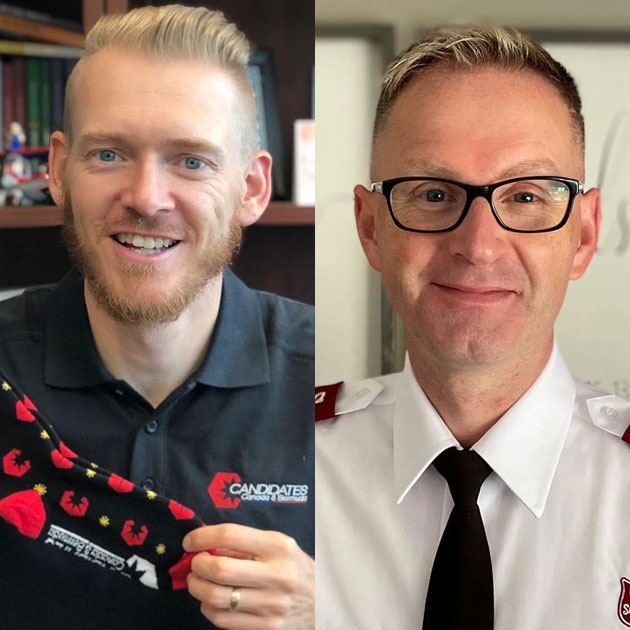 Episode five: Major Terence Hale, territorial children and youth secretary, and Major Carson Decker, divisional youth secretary, Maritime Division
Episode five: Major Terence Hale, territorial children and youth secretary, and Major Carson Decker, divisional youth secretary, Maritime Division
Brandon Laird: What is the greatest need for youth during the pandemic and how is The Salvation Army helping them?
Major Carson Decker: While I see a resilience in young people, there is still a need to be in community with each other. We’re not an island unto ourselves. We desperately need the influence, encouragement and support of one another.
Major Terence Hale: I think the time for superficial relationships is long gone. The pandemic has been driving us into intentionality in what we’re doing. We need to forego superficial relationships for ones that are deep and meaningful. This need has been heightened in the pandemic, as some of our young people have been severely disconnected and forced to lose a lot of their relationships.
BL: Months into the pandemic, what is God saying to us?
TH: God is telling me to lean in close, because we can’t waste our leadership. I believe there are three things that should make up the new normal of our ministries. Number one is worship. The second is evangelism: we need to get young people introduced to Jesus Christ, and have those young people introducing other people to him. Finally, holiness needs to be the new normal. It needs to be what moves us forward, and then we will know the path to walk in. In Isaiah, it tells us that we will hear a voice and a whisper from the Spirit saying, “This is the way; walk in it,” when we acknowledge the holiness of God (see Isaiah 30:21).
CD: There’s a quote that really resonates with me. When the church is in mission, it is the true church. As a follower of Jesus, I want to be engaged in that mission. I’ve recommitted to ensuring that everything I do from the office of the divisional youth secretary is to develop and invest in Christ-centred, others-focused disciples. It’s a daunting task, but it’s not impossible because the Spirit of God is with us, before us, behind us and journeying with us. Nothing is too difficult for him. I’m saying to the Spirit, use me however you want to, I want to be involved in kingdom business.
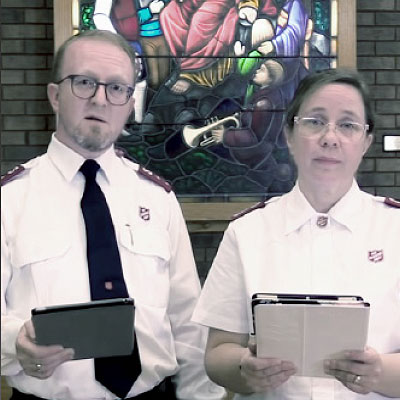 Episode six: Major Heather Samuel and Captain Nicholas Samuel, corps officers, London Citadel, Ont.
Episode six: Major Heather Samuel and Captain Nicholas Samuel, corps officers, London Citadel, Ont.
Brandon Laird: What are some of the challenges that you’ve faced during the COVID-19 season?
Captain Nicholas Samuel: I think the biggest challenge was the shock of the change of everything. For the online ministry on Sunday, for example, the biggest change has been the amount of time it takes to put a service together. Gone are the days where we would do our usual preparation during the week, worship together for an hour and a half with the congregation, and fellowship with each other. Now, we spend an entire evening recording different takes of various parts of the worship team or ensemble, and then the sermon and meeting, because only so many people can be in the same room at the same time with each other. That process takes a few hours one evening, and then a day and a half of editing for the tech team after.
There’s also the concern of those who have no internet access, or no device in order to join with us online. One Salvationist held her phone up to her computer speakers during a Sunday livestream so her sister, who doesn’t have a computer, could listen in.
Major Heather Samuel: Another challenge has been doing the pastoral visitation. We’ve had a few people who have had to enter hospital and we cannot visit with them there. Doing our regular visitation with our congregation has been difficult, as well, because there are a number who are in the higher risk category and they’re hesitant to even do a porch visit.
BL: What new opportunities or innovations
have come from this time?
HS: There has been innovation in the way we reach out to people, for example dropping off home-baked goods, instead of doing an in-home visit. Looking back to some of the things that were done pre-COVID, but even pre-technology days, it’s that personal touch that is still really important.
NS: We haven’t done anything amazingly groundbreaking or astoundingly new. It’s just been a
case of we’ll try it and if it works, it works. If it doesn’t, then we’ll try something else and explore it. We’re trying to maintain a regular pattern to our season while we do things differently, such as sharing ministry with people online while keeping our mission of reaching people to share the gospel of Jesus Christ.
Check out the bonus podcast on “Generous Living” with Tharwat Eskander, stewardship consultant, corps mission resource department, and Major Wendy Mouland, corps officer, Southlands Community Church, Winnipeg, at salvationist.ca/podcast.
Interviews have been edited for space and clarity.
Compiled by Leigha Vegh




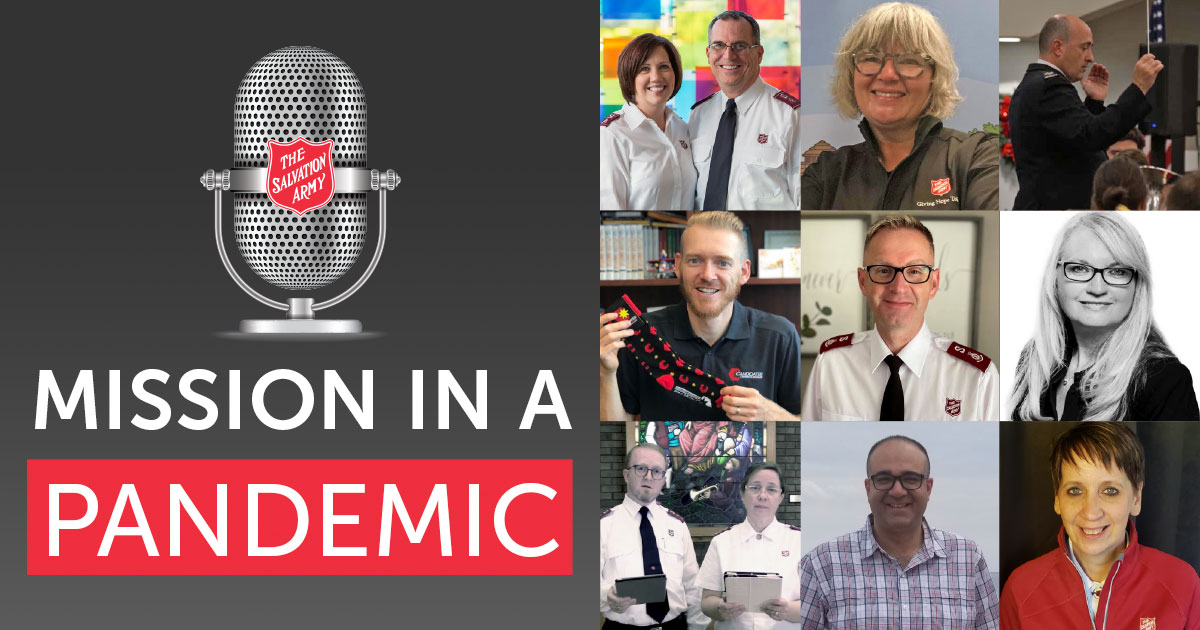
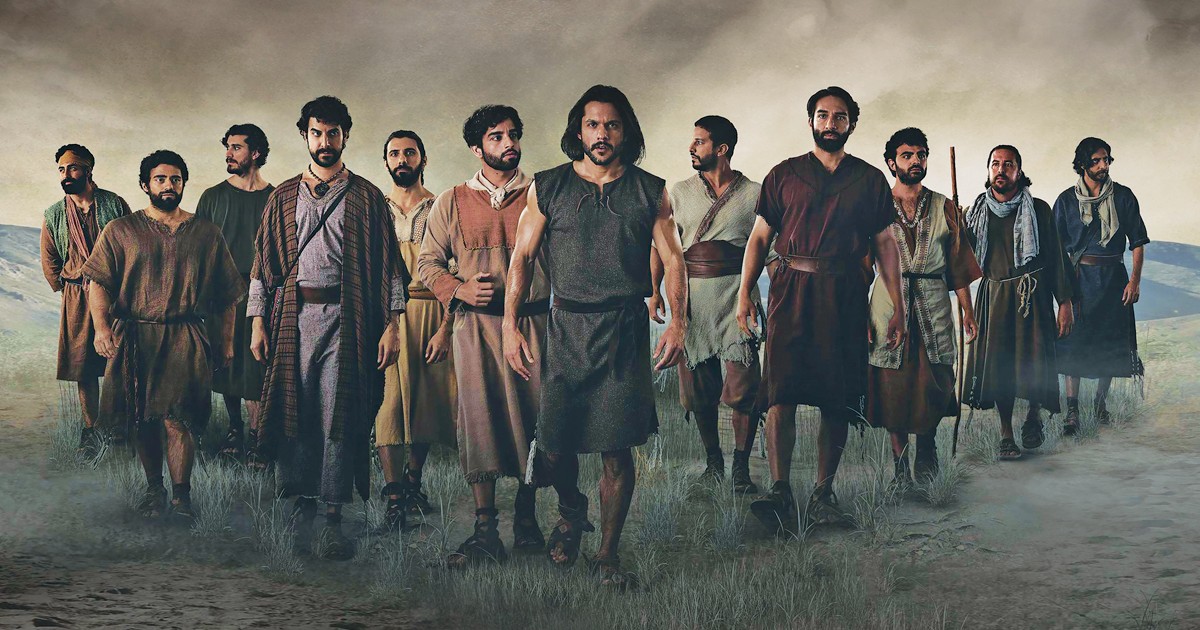
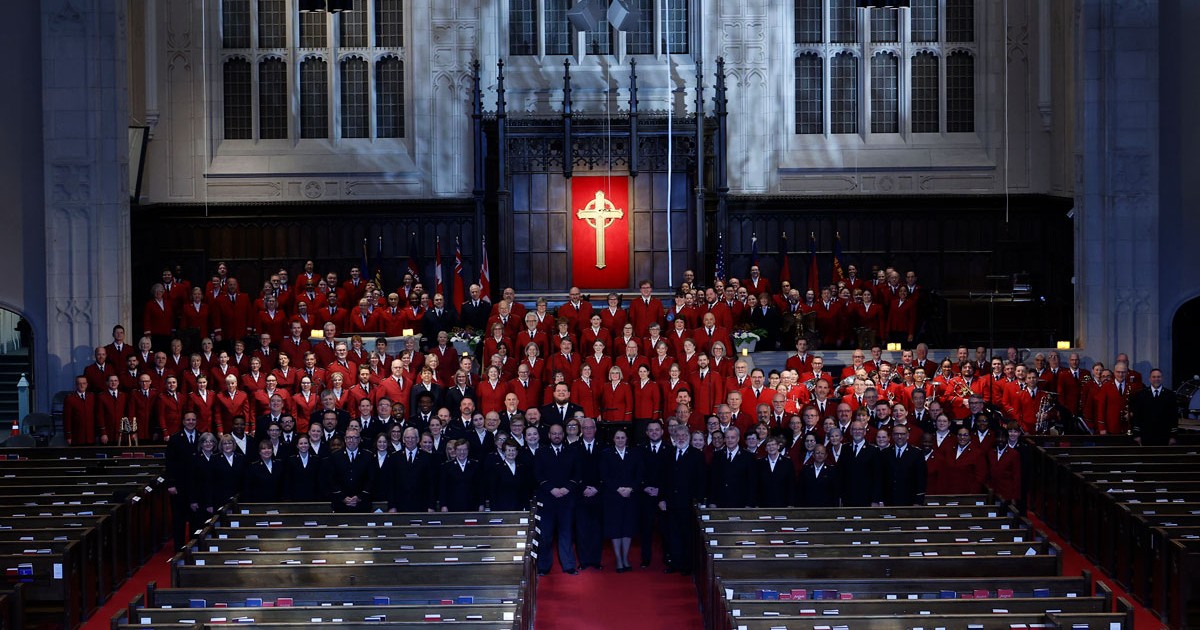



Leave a Comment